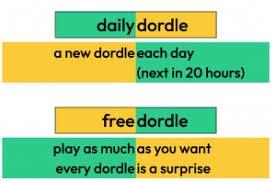From Crosswords to Dordle: The Evolution of the Modern Word Puzzle
For over a century, word games have entertained, challenged, and educated players around the world. From the first newspaper crosswords in the early 1900s to Scrabble nights with friends and now to browser-based brain teasers, these games have continuously evolved to match the pace of modern life.
Enter Dordle, a quiet but clever successor in the long line of word puzzles—one that strikes a perfect balance between simplicity and complexity in a digital world that often swings too far in both directions.
Let’s explore how Dordle rose from the shadow of its viral predecessor, carved its own niche, and became a daily ritual for thousands of wordsmiths and logic lovers alike.
A New Kind of Challenge

In early 2022, as Wordle exploded across the internet with its simple “guess the word in six tries” concept, it sparked a creative wave. Developers and puzzle enthusiasts around the world began asking: “What if we took that idea… and changed the rules?”
Dordle was one of the first successful answers to that question.
Instead of one word to guess, Dordle challenges you to solve two words at the same time, using just seven guesses total. You type one five-letter word per turn, and each guess contributes clues to both puzzles. The twist? The two words are completely unrelated—your brain must juggle two logical paths at once.
It’s not just harder. It’s smarter.
Why Dordle Feels Different
While Wordle offers a daily moment of satisfying challenge, Dordle feels more like a mental workout. Every decision has double the impact—and double the consequences.
Should you use a strategic “test word” to reveal new letters for both puzzles? Or commit to solving the side that’s already giving you strong clues? Do you take a risk with an uncommon word in hopes it’ll nudge both grids forward?
This added layer of strategy gives Dordle a sense of depth and replayability. You’re not just playing with letters—you’re thinking two moves ahead.
Accessible Yet Addictive
One of Dordle’s greatest strengths is its simplicity of access. There are no downloads. No registration. No ads. Just visit the website, and you’re immediately in the game.
The interface is clean. The color feedback is intuitive. The game respects your time and intelligence—something that’s becoming increasingly rare in modern digital design.
It also offers:
-
A Daily Dordle: Everyone gets the same challenge once per day.
-
A Free Play mode: Practice anytime with unlimited puzzles.
Whether you have five minutes or fifty, Dordle fits neatly into your schedule—without the pressure of streaks or competitive scoring.
A Puzzle for the Mindful Era
Many players find Dordle to be more than just a game. It’s a daily ritual, a break from noise, a moment of quiet focus. In a world where attention is constantly pulled in every direction, Dordle asks you to stop, breathe, and think.
It appeals to:
-
Students practicing vocabulary and logic
-
Professionals looking for a quick mental break
-
Retirees staying sharp with daily puzzles
-
Word game enthusiasts exploring something new
Unlike fast-paced games designed for endless play, Dordle encourages balance. When you’re done solving, you’re done for the day—no tricks, no loops, no endless notifications.
Tips for New Players
Want to improve at Dordle? Try these techniques:
-
Start with a balanced opener: Words like “table,” “crane,” or “audio” hit many common letters.
-
Track your clues side by side: Don’t let one puzzle overshadow the other.
-
Use filler guesses tactically: Even if a word doesn’t help solve either puzzle directly, it might expose critical letter positions.
-
Expect curveballs: Words may contain repeated letters or rare combinations. Stay flexible.
Like chess, the game rewards pattern recognition, patience, and calculated risks.
Final Words: Dordle’s Lasting Appeal
It’s easy to write Dordle off as “just another Wordle clone.” But spend a few days with it, and you’ll see it’s something more: a distilled, elegant puzzle that respects your time while sharpening your mind.
It doesn’t try to go viral. It doesn’t push microtransactions or leaderboards. It simply offers a clean, challenging experience—day after day, word after word.
In the lineage of great word games, Dordle has earned its place not by being loud, but by being brilliantly quiet. And for many, that’s exactly the kind of game we need right now.





